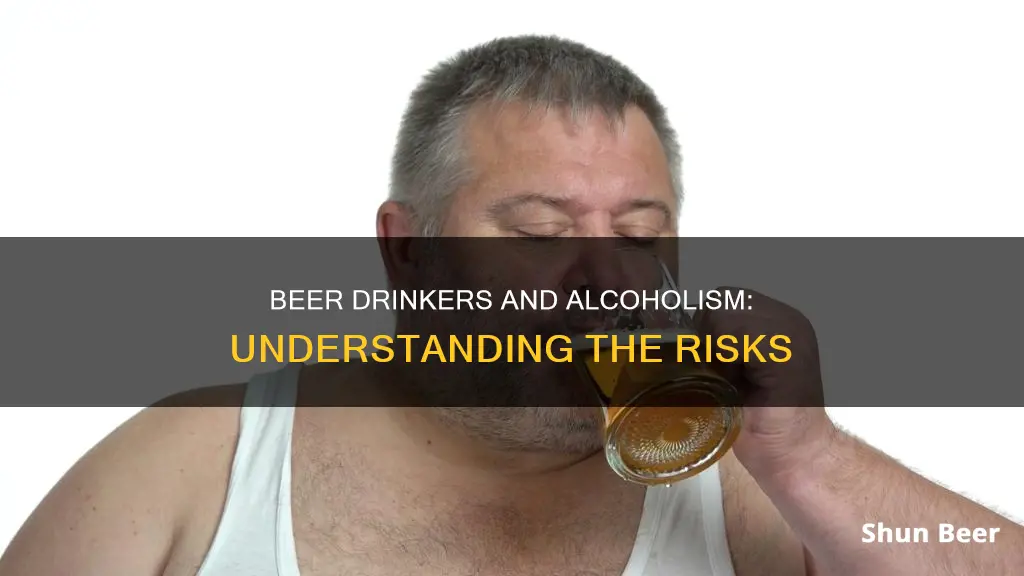
Alcoholism is a serious issue that affects a significant portion of the population. While beer is often perceived as a harmless beverage, consuming too much of it can be a sign of alcoholism. Beer, like any other alcoholic drink, contains ethyl alcohol or ethanol, which is a psychoactive substance that can lead to addiction. The risk of developing an addiction varies from person to person and is influenced by genetic, psychological, and social factors.
Although beer has a lower alcohol concentration compared to other drinks, excessive consumption can still lead to negative health consequences and impact an individual's life, relationships, and ability to function normally. It is important to recognize the signs of alcohol addiction and seek help if needed.
| Characteristics | Values |
|---|---|
| Alcohol consumption per week | Men: 15 or more drinks per week. Women: 8 or more drinks per week. |
| Alcohol consumption per day | Men: 4 or more drinks per day. Women: 3 or more drinks per day. |
| Binge drinking | Men: 5 or more drinks on one occasion. Women: 4 or more drinks on one occasion. |
| Alcohol tolerance | The need to consume larger amounts of beer over time to achieve the same effects. |
| Alcohol dependence | Physical and psychological dependence on alcohol. |
| Alcohol cravings | Strong cravings for alcohol. |
| Inability to control alcohol consumption | Inability to stick to drinking limits. |
| Withdrawal symptoms | Anxiety, tremors, sweating, nausea, irritability, etc. |
| Impact on life | Negative impact on health, relationships, work, finances, etc. |
What You'll Learn
- Beer contains alcohol and can lead to intoxication and addiction
- Beer drinkers may experience withdrawal symptoms like anxiety, tremors, sweating, nausea, and irritability
- Beer addiction can cause health issues like liver disease, cardiovascular problems, and mental health disorders
- Alcoholism can negatively impact relationships, careers, and finances
- Seeking professional help and support groups can aid in overcoming beer addiction

Beer contains alcohol and can lead to intoxication and addiction
Beer is often perceived as a harmless adult beverage, and many people do not associate drinking it with alcoholism. However, beer contains alcohol and can lead to intoxication and addiction.
Beer Contains Alcohol
Beer, like wine and hard liquor, contains ethyl alcohol, also known as ethanol, which is a clear, flammable, colourless liquid with a sharp, burning taste and a pleasant aroma. Ethanol is a psychoactive substance, meaning it can cause changes in brain function, leading to intoxication and potential addiction.
Beer Can Lead to Intoxication
The amount of alcohol in beer varies, but it typically has a lower concentration of alcohol per fluid ounce compared to other alcoholic drinks. However, this does not change the fact that beer is an alcoholic beverage with the same effects on the human brain and body as other types of alcohol. Beer consumption can lead to intoxication, which is characterised by impaired cognitive functions, altered mood, and increased risk of accidents and injuries.
Beer Can Lead to Addiction
While not everyone who drinks beer will become addicted, beer consumption can lead to alcohol addiction or alcoholism. Alcoholism is characterised by strong cravings for alcohol, an inability to control drinking, and continued drinking despite negative consequences. Beer consumption can disrupt brain chemistry by stimulating the release of dopamine, a neurotransmitter associated with the brain's reward system. This can create a cycle of repeated consumption to recreate the positive feelings associated with alcohol.
Additionally, regular beer consumption can lead to the development of tolerance, where an individual needs to consume larger amounts to achieve the same effects. This can increase the risk of developing an addiction. Prolonged and excessive beer consumption can also lead to physical dependence, resulting in withdrawal symptoms such as anxiety, tremors, sweating, nausea, and irritability when alcohol intake is reduced or stopped.
Signs of Beer Addiction
Signs that indicate a person may be addicted to drinking beer include forming a habit of drinking beer, experiencing withdrawal symptoms when trying to stop, and being unable to control drinking habits. Other signs include drinking more than intended, drinking to cope with stress or negative emotions, and neglecting responsibilities due to drinking.
Puppies and Beer: A Dangerous Mix?
You may want to see also

Beer drinkers may experience withdrawal symptoms like anxiety, tremors, sweating, nausea, and irritability
Alcohol withdrawal can cause a range of symptoms, from mild to severe, and can affect people with alcohol use disorder (AUD) who stop or significantly reduce their alcohol intake after long-term use. Beer drinkers who experience physical dependence on alcohol may also go through withdrawal.
Withdrawal symptoms can include anxiety, tremors, sweating, nausea, and irritability. These symptoms can be very uncomfortable and drive the drinker to continue consuming alcohol to avoid them. The discomfort and risk are higher for those who attempt to detox without medical help. It is important to seek medical advice and support during this process, as attempting to quit alcohol "cold turkey" can be dangerous.
The severity and duration of alcohol withdrawal vary from person to person and depend on several factors, such as body chemistry, co-existing health conditions, medications, and the use of other substances. Symptoms typically begin within six to 24 hours of stopping or significantly reducing heavy, long-term alcohol use. Mild symptoms may include headache, mild anxiety, and insomnia. More severe symptoms, such as hallucinations, can occur within 12 to 48 hours after the last drink. The risk of seizures is highest 24 to 48 hours after the last drink, and delirium tremens may appear from 48 to 72 hours after quitting.
Some people may experience prolonged withdrawal symptoms, such as insomnia and mood changes, that can last for weeks or even months. It is important to note that withdrawal symptoms can be life-threatening, and severe or complicated withdrawal often requires treatment in a hospital or intensive care unit (ICU).
Beer Drinking at Brimfield Fair: What's Allowed?
You may want to see also

Beer addiction can cause health issues like liver disease, cardiovascular problems, and mental health disorders
Beer addiction can have a significant impact on your health and well-being. While beer is often consumed casually, it is still an alcoholic beverage with the same effects on the brain and body as other alcoholic drinks, and it carries the same risks for abuse and addiction. Here are some of the health issues that can arise from beer addiction:
Liver Disease
The liver is responsible for breaking down alcohol. When you drink more than your liver can process, it can become badly damaged. Beer addiction can lead to several problems with the liver, including steatosis (fatty liver), alcoholic hepatitis, fibrosis, and cirrhosis. Steatosis, or a fatty liver, is the most common alcohol-induced liver problem. It involves a build-up of fat inside liver cells, which leads to an enlarged liver. Alcoholic hepatitis is an acute inflammation of the liver, causing liver cell death and often permanent scarring. Cirrhosis is the destruction of normal liver tissue, leaving scar tissue in place of the working tissue, which can cause the liver to stop functioning correctly.
Cardiovascular Problems
Beer addiction can negatively affect the heart and cardiovascular system. Beer causes an increase in blood pressure, which may lead to heart disease, heart attack, or stroke. Drinking beer can also lead to arrhythmia (irregular heartbeat) and cardiomyopathy, a disease of the heart muscle. Alcohol-induced cardiomyopathy is a condition where the heart changes shape due to long-term heavy alcohol use. The changes to the heart's shape cause long-term damage, leading to heart failure and severe problems. The heart muscles stretch and enlarge, weakening the heart muscle and reducing its ability to pump blood effectively, which in turn reduces the body's available oxygen supply.
Mental Health Disorders
Heavy alcohol use can create psychological problems and contribute to the development of mental health disorders. Beer addiction can lead to changes in mood, aggression, nervousness, and psychiatric symptoms such as depression, anxiety, and cognitive impairments. Alcohol interferes with the brain's chemistry, disrupting neurotransmitters and the hormonal system, which is linked to the progression of most mental disorders. Additionally, alcohol addiction can result in alcohol-related brain impairment (ARBI), causing issues with thinking, physical coordination, and memory.
Beer and Crohn's Disease: What's Safe to Drink?
You may want to see also

Alcoholism can negatively impact relationships, careers, and finances
Alcoholism can have detrimental effects on various aspects of a person's life, including their relationships, career, and finances.
Relationships
Alcoholism can lead to strained relationships with family, friends, and colleagues. It can cause individuals to neglect their social activities, hobbies, and interests, resulting in social isolation. Alcohol dependence can also lead to mood alterations, such as irritability, aggression, or depression, further impacting personal relationships.
Career
Alcohol abuse can negatively impact an individual's career in several ways. Employees who drink heavily or are dependent on alcohol can experience impaired performance, increased absenteeism or sick days, and reduced productivity. This can lead to poor attendance records, high employee turnover, and increased healthcare costs for the employer. Alcoholism can also affect job security, as it may lead to job loss due to decreased work performance or inability to fulfil work obligations.
Finances
Excessive drinking can have significant financial implications. The cost of alcohol itself can add up quickly, especially for those who drink frequently or binge drink. Additionally, drinking can lead to impulsive spending, such as buying rounds of drinks for others or making unnecessary purchases while under the influence. Alcoholism can also impact finances indirectly through decreased work productivity and potential job loss, resulting in reduced income. Furthermore, excessive drinking can lead to increased medical expenses due to alcohol's negative effects on the body, including issues with the liver and pancreas.
It is important to note that the impact of alcoholism goes beyond these areas and can also affect physical and mental health, increasing the risk of accidents, injuries, and various health conditions. Recognizing the signs of alcohol dependence and seeking professional help are crucial steps towards healthier drinking habits and mitigating the negative consequences of alcoholism.
The Art of Beer: A Guide to Flavorless Sipping
You may want to see also

Seeking professional help and support groups can aid in overcoming beer addiction
Beer, like other alcoholic drinks, contains ethanol, a psychoactive substance that can lead to addiction. While some individuals may drink beer moderately without developing a dependence, others may find themselves drinking larger amounts to achieve the same effects, which is a sign of addiction. Alcohol stimulates the release of dopamine in the brain, creating a sense of pleasure and satisfaction, which encourages repeated consumption. Over time, this can lead to the development of tolerance and physical dependence, making it challenging for individuals to control their drinking habits.
Seeking professional help is a crucial step in overcoming beer addiction. It is important to remember that alcohol use disorder (AUD) is a common medical condition that can affect anyone, and specialised treatment is available. Primary care providers, such as doctors and nurse practitioners, play a vital role in the treatment process. They can help evaluate drinking patterns, craft a treatment plan, assess overall health, and determine if medications are appropriate. These medications, such as naltrexone, acamprosate, and disulfiram, can help reduce the urge to drink, decrease negative symptoms during abstinence, and discourage drinking by causing unpleasant side effects when alcohol is consumed.
In addition to medications, behavioural treatments are also crucial in changing drinking behaviour. Cognitive-behavioural therapy (CBT), for instance, helps individuals identify the feelings and situations that contribute to heavy drinking and develop strategies to cope with triggers. Other forms of therapy, such as motivational enhancement and contingency management, also play a role in strengthening motivation and reinforcing positive behaviours. Couples and family counselling can also be beneficial by involving spouses and family members in the treatment process, repairing and improving relationships, and providing a strong support system.
Support groups, such as Alcoholics Anonymous (AA) and other 12-step programs, offer peer support for those quitting or cutting back on their drinking. These groups provide a sense of community and understanding, as well as practical strategies for managing cravings and avoiding triggers. They are typically free and flexible, allowing individuals to access help and support whenever needed. Support groups can be particularly effective when combined with treatment led by healthcare providers, offering an additional layer of support on the road to recovery.
Overcoming beer addiction is a challenging journey that often involves setbacks. However, with persistence, professional help, and the support of groups like AA, individuals can develop the skills and resilience needed to manage their drinking habits and work towards a healthier and more fulfilling life.
Drinking Beer and Taking Bactrim: What You Need to Know
You may want to see also
Frequently asked questions
There is no set number of beers per day that indicates alcohol abuse. However, consuming more than four drinks daily for men or three for women raises the risk of alcohol use disorder. The National Institute on Alcohol Abuse and Alcoholism (NIAAA) offers some parameters to help identify harmful drinking patterns. For men, this means consuming five or more drinks on any day or 15 or more drinks per week. For women, it's four or more drinks on any day or eight or more drinks per week.
Beer addiction signs include:
- Needing more beer over time to feel its effects.
- Experiencing physical or psychological withdrawal symptoms when not drinking beer.
- A strong and uncontrollable urge to drink beer.
- Spending a lot of time obtaining, using, or recovering from the effects of alcohol.
- Drinking more or for longer than intended.
- Failing to meet work, school, or family obligations due to beer consumption.
- Continuing to drink despite adverse circumstances.
- Abandoning hobbies and social activities in favor of drinking beer.
- Relying on beer to deal with stress, anxiety, depression, or other emotional issues.
Drinking beer daily can lead to weight gain, liver damage, an increased risk of heart disease, alcohol dependence, and exacerbated mental health issues.







